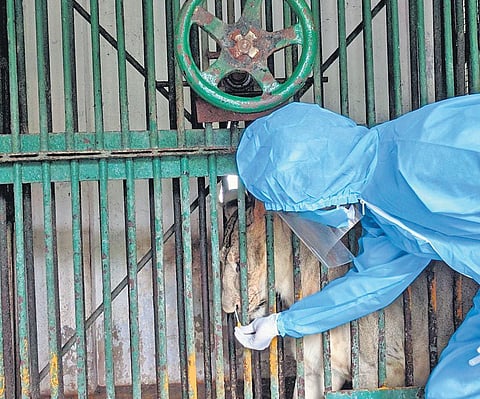

CHENNAI: The three samples that were sent to the Centre for Cellular and Molecular Biology (CCMB) in Hyderabad for genome sequencing of the coronavirus strain that infected Asiatic lions in Arignar Anna Zoological Park, have allegedly been found leaking and contaminated.
Sources told Express that all samples were leaking, and despite best efforts by CCMB scientists, they could not be used. “As per the CCMB protocol, such samples are not considered for diagnosis,” a source said. A formal communication in this regard was sent by the CCMB to the Vandalur Zoo on Friday.
When contacted, Dr Karthikeyan Vasudevan, scientist-in-charge of CCMB, neither confirmed nor denied the development. “We have a non-disclosure agreement with the users. So, I can’t reveal anything. The report has been sent to Vandalur Zoo.”
Express couldn’t verify whether the zoo authorities secured a reserve sample of deceased lioness Neela, to resend it for genome sequencing. If not, a crucial piece of genetic material would be lost forever, considering Neela was the first big cat to have died of Covid-19 in India with no apparent health complications and symptoms.
‘It may be too late now to collect samples from lions again’
It is not clear how the samples leaked when there are standard techniques and protocols for collection and transport. Florida Tilton, CMD of Chennai-based Biozone Research Technologies Pvt Ltd, told Express genome sequencing is the most important thing during a pandemic such as this. “It will give us a deep understanding of the strain that infected the lions.
We will know whether it is similar to the one infecting humans, how different it is from the strains that infected big cats in other zoos across the country, whether it is mutating, its behaviour in terms of how fast it spreads, the kind of symptoms and the intensity of the disease it causes. All this information is crucial for future diagnosis and treatment. It can be known only through genome sequencing,” said Florida.
Even if Vandalur Zoo chooses to resend the samples, collecting them afresh from the lions that are recovering from Covid, it may be too late. A scientist from Bengaluru-based National Centre for Biological Sciences told Express the virus has a life cycle.
“In humans, the coronavirus’ life cycle is 14 days. We do not know what the virus’ life cycle is in lions. For genome sequencing, the researchers require a sample containing the live virus for them to break open its cells and isolate the genetic material. If the sample is collected after the life cycle, genome sequencing is not possible.”
On June 3, the zoo reported that nine of its lions had tested positive for Covid-19, of which one young lioness, Neela, succumbed to the disease. All the samples were collected between May 24 and 28.
On Saturday, Vandalur Zoo issued a press release on the health of the lions. It said two, including the deceased Neela, had tested positive. A total of seven samples (four tigers and three lions) were sent to the Indian Veterinary Research Institute in Bareilly on June 4 and the results were communicated to the zoo on June 9.
“If there is a new lion that has tested positive apart from the previous nine, then we would have a good sample to send for genome sequencing,” said sources. Zoo director Debasis Jana did not responded to queries from Express.
ALSO SEE: